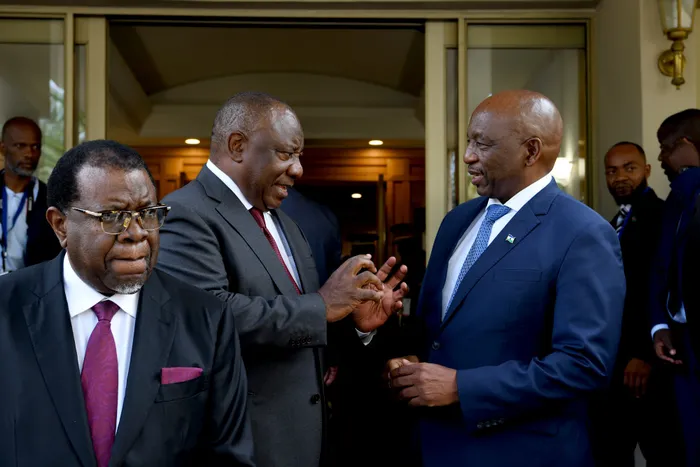SADC’s 2023 Troika Summit and the Eswatini crisis: The return of the frontline states?

Picture: Yandisa Monakali/DIRCO – South Africa’s President Cyril Ramaphosa participates in the Southern African Development Community (SADC) Extraordinary Organ Troika Summit taking place in Windhoek, Namibia, on January 31, 2023.
By Nompumeleo Ndawonde
On January 31, 2023, the Southern African Development Community (SADC) hosted its Extraordinary Troika Summit in Windhoek, Namibia. The Troika, comprising South Africa, Zambia, and Namibia, discussed the political and security situations in the region.
The kingdom of Eswatini was central to the agenda as police brutality, the repression of pro-democracy protests, and the recent brutal murder of activist and human rights lawyer, Thulani Maseko, on January 21, 2023, have deepened the tensions that continue to fester in the country.
King Mswati III, who has been in power since 1986, ignored the invitation, followed by a last-minute cancellation of a special summit of the Organ on Politics, Defence and Security Co-operation, to discuss the Eswatini crisis, which was to be held in July 2022.
Despite the Multi-Stakeholder Forum (the Forum) calls for the cancellation of the 2023 election, the government’s commitment to retaining the monarch continues to override pro-democracy national dialogue and the quest for peace in the troubled country. Could the Eswatini crisis see the revival of the Southern African frontline states?
Indeed, an attempt to predict the future is very helpful in assessing the past. Unlike other regional organisations in Africa, SADC emerged as a coalition dedicated to the independence of the oppressive apartheid and white-minority regimes in South Africa and Zimbabwe (then Rhodesia). The success of the front-line states (FLS) was peaked by the victory of Robert Mugabe’s Zimbabwe African National Union (ZANU-PF), thereby gaining regional diplomatic strength to isolate the apartheid regime in South Africa.
This triumph ultimately led to an resurgence of Pan-Africanism and liberation movements in a region once dominated by the racially segregating national party. In a bid to destabalise and blunt the stability of the FLS and the ever-consolidating African National Congress (ANC), military counter-revolutionary tactics were employed.
Although the FLS became invaluable in sheltering the exiled ANC members and strengthening the ANC strongholds, South Africa’s economic hegemony in the region continued and he financial dependency between these states as many were migrant workers in South Africa’s mines. Ultimately, the FLS lacked the economic and military might to decisively dismantle white rule in South Africa. Despite this, their efforts gathered international outcry that ultimately forced the hand of the South African government to enter into negotiations with the ANC leaders. Could the same be achieved in Eswatini?
As Africa’s last absolute monarch, King Mswati III has complete authority to command the police and military, dismantle the government, and dismiss judges. Thus, like the FLS, the troika’s hands seem to remain tied in forcing real change in the country.
Further, SADC’s militarised intervention in the Democratic Republic of Congo (DRC), dispatchment of a special envoy to Lesotho, and its “weak” peacekeeping efforts in Mozambique have been heavily criticised as being riddled by corruption, patronage, and greatly influenced by national interests. This calls into question whether the recent extraordinary troika summit is a genuine attempt towards resolving the Eswatini’s broken system.
There are clear parallels between the past and the present. In the face of great opposition, the FLS unified as a region against racial discrimination in South Africa and gained with them the support of the international community. Boycotts, sanctions and isolations in international sport, blockage of foreign loans, and restrictions in imported and exported goods, were fundamental in ridding South Africa of apartheid.
Unlike in the 1980s, South Africa is no longer the pariah but a regional stronghold. Despite this, the former head of the security organ of SADC and President Cyril Ramaphosa’s visits to the monarch have proven fruitless. Further, an agreement for a national dialogue was neglected, while the customary Sibaya dialogue has yielded no concessions from the King.
The country has proven unsafe for citizens, fearing targeted attacks. To date, no calls for SADC military intervention have been made, neither has there been a genuine attempts to attract international support. FLS achievement in the past should not be beyond SADC’s reach. The question remains, why are they unresponsive?
It is important to note that former monarch, King Sobhuza II, signed the Pretoria accord in 1982, to ensure the protection and power consolidation of the royal family by the South African apartheid regime. Though, in exchange, liberation fighters, at the time, would not be safeguarded in Eswatini.
During apartheid, there was a feeling that liberation in South Africa would intensify anti-monarch sentiments in neighbouring Eswatini, and Royal Swaziland Police were accused of killing many Umkhonto weSizwe cadres.
More shockingly, recent allegations have emerged that, South African apartheid mercenaries are working in tandem with Swati security personnels to disband pro-democracy actors, who have been categorised as “terrorists”. If this were to be true, then the webs of bureaucratic treachery run so deep, thereby exposing SADC’s refusal to intervene.
The 2023 troika summit may have appeared to be a positive move in the right direction towards renewing people’s faith in the frontline states that once committed itself to threat management; however, extreme nationalism and the jettisoning of regional interests, have the tendency to deepen the conflict security issues, and aggravate the blatant human rights abuses in Eswatini.
Nompumelelo Ndawonde is a Researcher at the University of Johannesburg’s (UJ) Institute for Pan-African Thought and Conversation (IPATC).